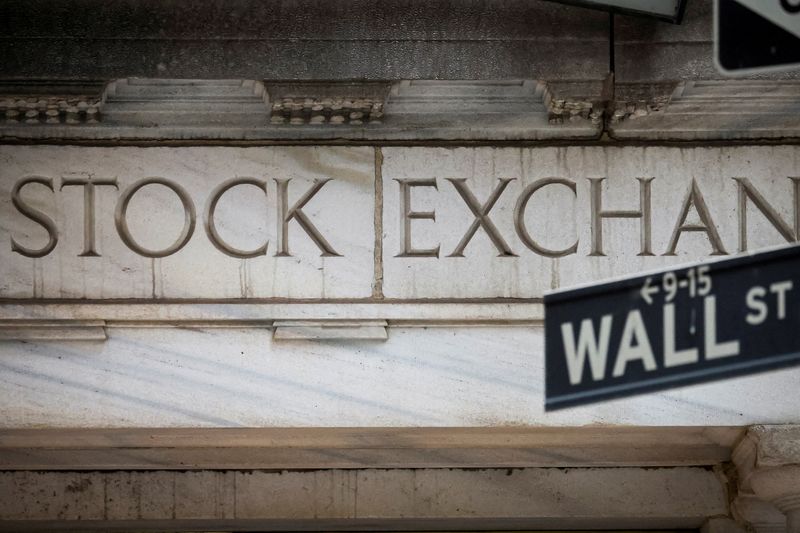By David Randall
NEW YORK (Reuters) - Signs of strength in the U.S. economy have buoyed stocks in the face of rising Treasury yields and hawkish Federal Reserve expectations, though some investors believe the rally may be on borrowed time.
Stronger-than-expected reports on employment, retail sales and inflation have pushed up expectations for how much higher the Federal Reserve will need to raise rates and ignited a surge in Treasury yields - typically a negative development for stocks.
Yet the robust data has also dispelled fears of an impending recession that plagued Wall Street at the end of 2022, giving investors a reason to hold on to equities, at least for now. The S&P 500 is up 6.6% for the year-to-date, even as benchmark 10-year Treasury yields have risen nearly 50 basis points from their lows of the year.
Only 24% of global fund managers now expect a recession, down from 77% in November, a recent survey by BofA Global Research showed.
“Everyone came into the year thinking that there’s an imminent recession in the first half of 2023,” said Charlie McElligott, managing director, cross-asset strategy at Nomura Securities. “They got caught off guard because there’s much more resilient domestic and global growth.”
Graphic: Yields vs stocks: https://fingfx.thomsonreuters.com/gfx/mkt/znvnbkwnlvl/Pasted%20image%201676580956813.png
Investors’ resolve can be seen in the resilience of the Nasdaq Composite Index, home to many of the tech and growth stocks that were particularly sensitive to higher yields last year, when it registered a 33% loss.
Based on historical regression, the Nasdaq should have sold off between 5% and 10% based on the increase in two-year yields since the Fed meeting earlier this month, according to a report from analysts at JPMorgan (NYSE:JPM), including chief global markets strategist Marko Kolanovic. Instead, the index is up 0.3% over that time, and is up 13.3% for the year to date.
Some investors say the market’s resilience is unlikely to last much longer, especially if yields keep rising. Higher Treasury yields can weigh on stocks as they offer equities investment competition, increase companies borrowing costs and hurt valuations.
Many also believe that a recession has been delayed but not avoided. A severe downturn could await in the second half of the year, especially if rebounding inflation forces the Fed to keep rates at a higher level for longer to cool prices.
“The market in equities is just not appreciating that there will be more stepping on the brakes from the Fed and more earnings at risk of going lower,” said Torsten Slok, Chief Economist at Apollo Global Management (NYSE:APO). “Everyone wants to buy the dip in the stock market but the risk is that with inflation at 6.4% the Fed is just not done."
There are already signs that investors may be growing nervous over the economy’s strength. The S&P 500 dropped 1.4% on Thursday, helped in part by a stronger than expected U.S. producer price index reading.
Bearish investors also note other factors that tend to weigh on stocks have reared their heads in recent weeks. Real yields - which measure return on Treasury yields after inflation - have turned higher, taking the yield of the U.S. 10-year Treasury Inflation Protected Security near its highest level since early January. That can dull the allure of stocks, which are seen as far riskier than U.S. government bonds.
Rising yields have also arrested a decline in the U.S. dollar, which tumbled from a two-decade high in the latter half of 2022 but is now up nearly 3% from its low of the year against a basket of currencies. A stronger dollar tends to hurt the profits of U.S. multinationals and exporters.
In BoFA's survey, 66% of fund managers said the move in stocks, which began in October and has seen the S&P 500 rise 14% from that month's lows, was a bear market rally rather than a new bull market.
Still, some investors believe risks are tilted in favor of stocks, with the bulk of the Fed’s monetary policy tightening likely in the rearview mirror and valuations broadly lower after last year’s 19.4% selloff in the S&P 500.
Lara Reinhard, senior portfolio strategist at Janus Henderson Investors, is avoiding technology and growth stocks but focusing on shares of companies that pay out dividends as a hedge against inflation.
“We are starting at more normal valuations and in some cases cheaper valuations than in the last few years,” she said.

Meanwhile, stocks are getting strong support from retail investors, who pumped a record net average of $1.51 billion per day into U.S. stocks over the last month, according to Vanda (NASDAQ:VNDA) Securities.
"Retail investors have plenty of dry powder in the form of capital parked in money market funds that could be deployed in the equity space once confidence about future market returns increases more broadly," the firm's analysts wrote.